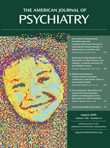Potential Limitations in Generalizing Findings From the TORDIA Study
To the Editor: In the April 2009 issue of the Journal , David A. Brent, M.D., et al. (1) examined predictors of suicidal adverse events in the treatment of selective serotonin reuptake inhibitor (SSRI) resistant depression in adolescents. The authors found that adjunctive use of benzodiazepines in a small patient group (N=10 [3% of the total sample]) was associated with a higher rate of both suicidal and non-suicidal self-injury. They concluded that the disinhibitory effects of benzodiazepines may lead to increased risk-taking behavior. This finding was reiterated in an accompanying editorial (2) .
We suggest that this finding in such a small subgroup more likely represents a selection bias. Patients with comorbid anxiety disorders who have a higher risk of suicidal behaviors (3) are more likely to require adjunctive pharmacological treatment. Benzodiazepines may also have been prescribed for high levels of distress or agitation in this subgroup, which would also lead to an increase in self-harming behaviors. Given the small sample size and lack of information about comorbid diagnoses, the authors’ conclusion cannot be generalized to the population as a whole.
1. Brent DA, Emslie GJ, Clarke GN, Asarnow J, Spirito A, Ritz L, Vitiello B, Iyengar S, Birmaher B, Ryan ND, Zelazny J, Onorato M, Kennard B, Mayes TL, DeBar LL, McCracken JT, Strober M, Suddath R, Leonard H, Porta G, Keller MB: Predictors of spontaneous and systematically assessed suicidal adverse events in the Treatment of SSRI-Resistant Depression in Adolescents (TORDIA) study. Am J Psychiatry 2009; 166:418–426Google Scholar
2. Weissman MM: Teenaged, depressed, and treatment resistant: What predicts self-harm? Am J Psychiatry 2009; 166:385–387Google Scholar
3. Foley DL, Goldston DB, Costello EJ, Angold A: Proximal psychiatric risk factors for suicidality in youth: the Great Smoky Mountain Study. Arch Gen Psychiatry 2006; 63:1017–1024Google Scholar



